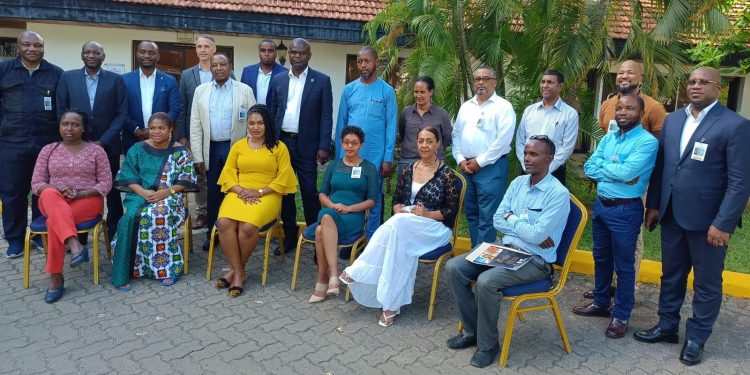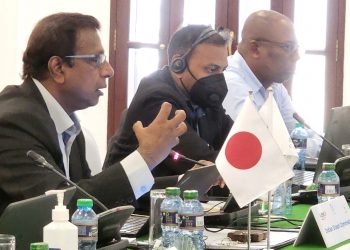The Africa Union Commission (AUC) in collaboration with German International Development Agency (GIZ) convened a workshop from 22 to 25 November 2022 in Mombasa, Kenya to examine the adoption of decarbonization and digitalization goals in the African maritime sector. Various port representatives present at the event shared remarkable initiatives so far achieved in making African ports competitive and efficient.
In the last couple of years, decarbonization has become a prominent topic in shipping and maritime transport circles. Stakeholders around the world have also set ambitious targets to reduce greenhouse gas emissions from International shipping.
Guided by the International Maritime Organizations (IMO) Greenhouse Gases (GHG) Strategy, the maritime industry commits to reduce carbon emissions by at least 50% by 2050 compared to the 2008 levels.
It is for this reason that Africa should unite to chart a collective roadmap to decarbonize its maritime industry.
At the workshop, a representative from Kenya Ports Authority (KPA) presented a comprehensive Green Port policy designed for Mombasa Port. The primary goal of the policy is to reduce the port’s carbon footprint and is currently being implemented in phases.
A notable aspect of the policy is pivoting the port to harness renewable energy for its internal operations. So far, Mombasa port generates close to 5 MW (Megawatts) of solar energy accounting to a third of the port’s energy needs. For instance, the cruise terminal is fully powered using solar energy.
In addition, the port is rolling out shore-power supply to allow ships to switch-off engines while berthed at the port.
Workshop delegates during a tour of the Port of MombasaAt Walvis Bay in Namibia, production of green hydrogen forms part of its long-term goal to decarbonization. Ammonia and hydrogen have been identified as the most promising zero-carbon bunker fuels. Thus, port investments aligned to production of these fuels is a major contribution to decarbonize shipping industry.
On digitalization, most African ports have made efforts to digitalize their operations. One of the common approaches observed are investments in national single window systems with some countries already in advanced stages of implementation.
For instance, the recently launched second container terminal at the port of Abidjan in Ivory Coast, have automated gates and an online truck appointment system.
While it is commendable to have automated ports, preparation is moderate on maritime cyber security. According to a 2020 research conducted by the maritime cyber defense firm Naval Dome, cyber-attacks on the maritime industry’s operational technology( OT) systems had increased by 900 per cent between 2017- 2020.
Unfortunately, even with such a high-level risk of maritime cyber-attacks, only 14 countries have signed the AU Malabo convention. The framework provide essential technical guide for national cyber-security policies, which can be transferred to Ports.
Most importantly, automating ports is a significant step towards transparency and visibility of African supply chains. In fact, this could accelerate the ambitions of AfCFTA.
In this view, some participants suggested that AU could take the role of defining digital standards to provide a collective threshold as African countries implement ports digitization.
The first paradigm shift in shipping came in 1956, when Malcolm Mclean standardized the container shipping. The second one is likely to be an outcome of how best we define digital standards in the maritime industry.
An almost similar approach is also needed in decarbonizing the shipping in Africa. Investments in green ports is a gargantuan matter even to the developed nations.
A number of approaches were identified that could possibly lessen the burden of maritime decarbonization.
First, as AU member countries pivot to intra-African trade, creation of end-to-end green shipping corridors should be in the backdrop of the upcoming trade routes. Such an approach is feasible as some African countries are already positioning themselves as clean fuels export hubs.
The other approach is exploring the interlinkage between cities and ports. Most of the world’s megacities have an intricate relationship with ports.
Hence, decarbonization of ports is highly dependent on environmental policies made at the city level.
Some African nations are part of C40 Cities, which is a network of mayors of nearly 100 world-leading cities collaborating to confront the climate crisis.
Under C40 Cities is the Global Ports Forum, connecting port cities and ports around the world in taking a collective action to decarbonize global supply chains.
This could be a fulcrum to green some of the Africa’s trade gateways.
The other link is through port management associations, for example PMAESA and PMAWCA. These regional bodies offer a great platform to stream digitalization and decarbonization of the African ports and maritime sector.
PMAESA, for instance, is collaborating with the Indian Ocean Commission on a feasibility study for development of a regional maritime single window system.
On the other hand, PMAWCA through a grant from the World Bank and facilitated by PENAf (Ports Environmental Network- Africa), is implementing a project dubbed Sustainability Ports Partnership. The overall objective of the project is to support sustainability transition of West and Central African ports. The project aims to create a cooperative and collaborative mechanism for port authorities and operators to cut ports’ carbon footprint- mainly through eco-friendly infrastructure development and protection of coastal ecosystems.







